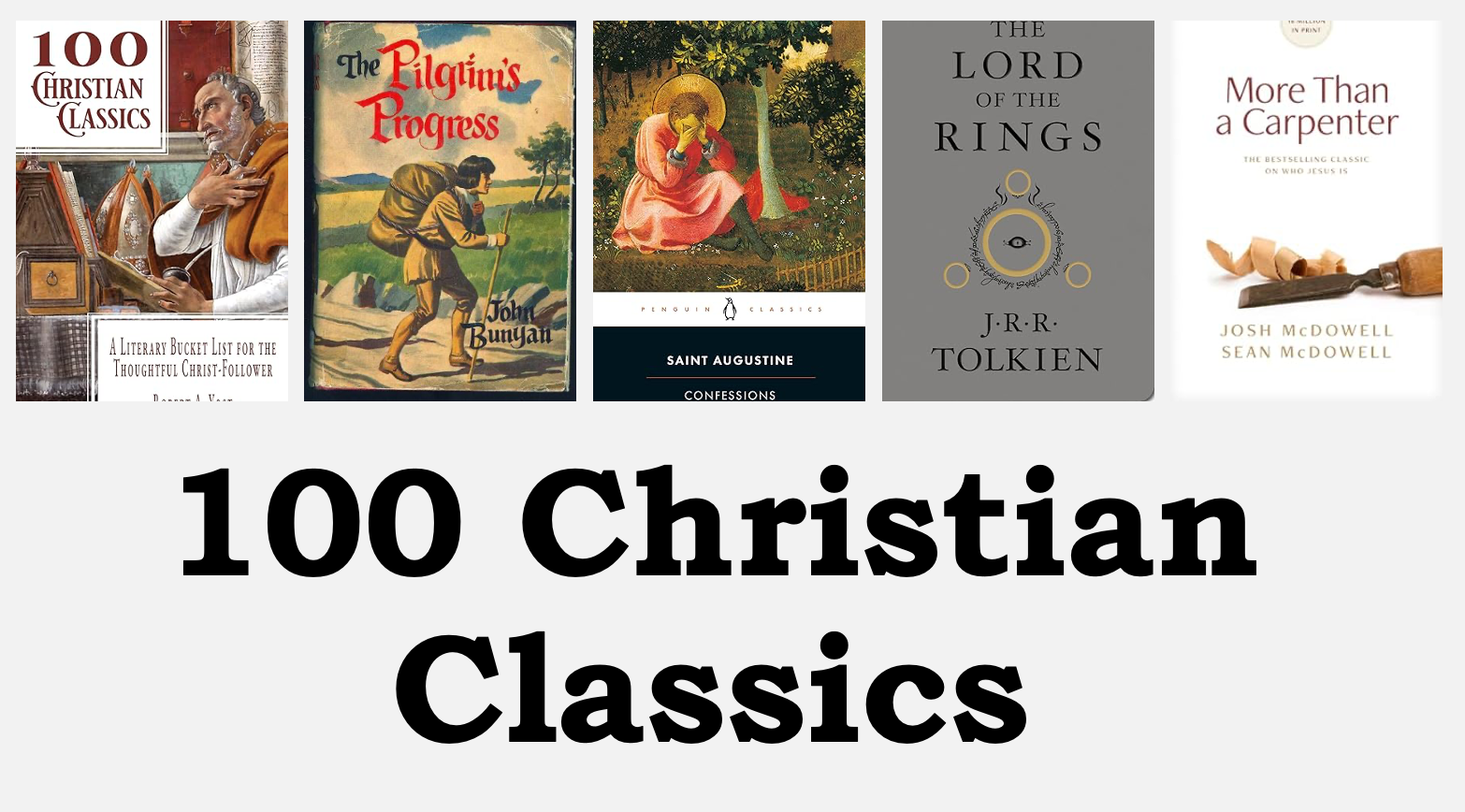Robert Yost has recently compiled a fascinating list of the top 100 Christian classics. In his new book, Yost talks about why each book is so important and offers a helpful introduction for reading it fruitfully. This book is truly a gift to the church. Check out our brief interview and consider getting a copy of his excellent book 100 Christian Classics.
Sean McDowell: Why did you write this book?
Robert Yost: We who are Christ-followers are people of the Book. Yet, as I ask in my first chapter, “Are books becoming obsolete?” There are some disturbing trends I have noticed. On the positive side, the number of books being published each year is increasing. We can thank, for better or for worse the self-publishing trend. On the negative side, the number of readers appears to be decreasing. Average book sales are decreasing and the book marketplace has become stagnant over the past couple of decades. In addition, the publishing industry has changed dramatically and not for the better.
When I was growing up back when the earth’s crust was cooling, many people read for pleasure whether it was books themselves or newspapers and magazines. Today, it seems that fewer are reading for pleasure. Printed books are being rejected for Kindle editions and magazines and newspapers have likewise changed. Newspapers are much smaller than they were a half-century ago and many read their news online. Although Christians will always be readers, or at least they should, the quality of books being read are the literary equivalent of fast food, quick and easy, but not particularly nourishing.
This book will help steer believers toward books that will enable them to grow spiritually. As the late great spiritual giant John Stott wrote in his Basic Christianity, “I would urge you not only to study the Bible but to read good Christian books. To neglect to grow in your understanding is to court disaster” (137).
Sean McDowell: How did you determine which books to include in your list of 100?
Robert Yost: My list of 100 books is a very personal one and reflects the best judgment of one man. Another’s list might be entirely different. However, there were some books nobody’s list would exclude such as The Pilgrim’s Progress by John Bunyan, Of the Imitation of Christ by Thomas a Kempis, Augustine’s Confessions, John Milton’s Paradise Lost, and The Divine Comedy by Dante Alighieri. It would have been a crime to exclude those titles.
Although I had an extensive list of my own “must include” titles, I did solicit the opinions of others. For example, I asked dozens of friends and acquaintances who are either pastors or biblical/theological scholars in the evangelical tradition to suggest five to ten titles that I should include. Finally, I asked dozens of laypersons from a variety of faith traditions as well as from my adult Bible class at First Presbyterian Church of Haines City, FL to suggest one book that is a “must read” for believers.
I wanted as wide a selection of books as I could find. From the nineteen pages of typed data, I look for books that showed up again and again and used that data to help me make my final decisions. But my decision of which books to include was mine and mine alone.
Sean McDowell: Which authors show up multiple times in your book and why is this so?
Robert Yost: Nine writers show up in this book twice. They are Alexander Whyte, Andrew Murray, Tim Keller, Paul Little, Dietrich Bonhoeffer, Eugene Peterson, A. W. Tozer, J. R. R. Tolkien, and T. S. Eliot, not a lightweight in the bunch and several spiritual giants. Four writers appear three times: C. S. Lewis, John Stott, R. C. Sproul, and Francis Schaeffer, all there for good reason.
C. S. Lewis, Francis Schaeffer, and John Stott were prolific writers who wrote Christian classics for the church at large, whereas Sproul’s ministry was mainly to a Reformed audience. The problem I had with their writings were not which ones to include, but which ones to leave out. Alexander Whyte was a Scottish pulpit giant of over a century ago who also gave the church the greatest book on Bible characters ever written as well as his classic, Lord, Teach Us to Pray.
Andrew Murray’s two devotional classics, Absolute Surrender and With Christ in the School of Prayer, have enriched the hearts of believers for well over a century. Dietrich Bonhoeffer, the German pastor and theologian who was hanged by the Nazis at Flossenburg Concentration Camp in 1945, is the epitome of a believer who lived and died for his faith in Christ. The two books included here, Life Together and The Cost of Discipleship, are true Christian classics in every sense of the word.
The fiction writer J. R. R. Tolkien and poet T. S. Eliot and are still read and are hugely influential even today. For example, if you haven’t seen The Hobbit and The Lord of the Rings trilogy, you must have been living in a cave in the desert the last few decades.
Sean McDowell: Which is the favorite of your 100 classics?
Robert Yost: The Bible is, of course, the obvious choice. The great sin of the Christian church is that it is often left unread by so many who say they are believers. If the Bible is God’s great love letter to the church, why do so many leave great sections of it unread?
Other than the Bible, I would have to say my favorite is Knowing God by J. I. Packer. It is such a wonderful and influential book by one of the most well-respected Christian writers of the past half-century. I consider Packer to be a true spiritual giant upon whose shoulders I, along with thousands of others, stand. And to think, his ambition at one time was to be a professional jazz musician. Likewise, I wanted to be the next Eric Clapton.

